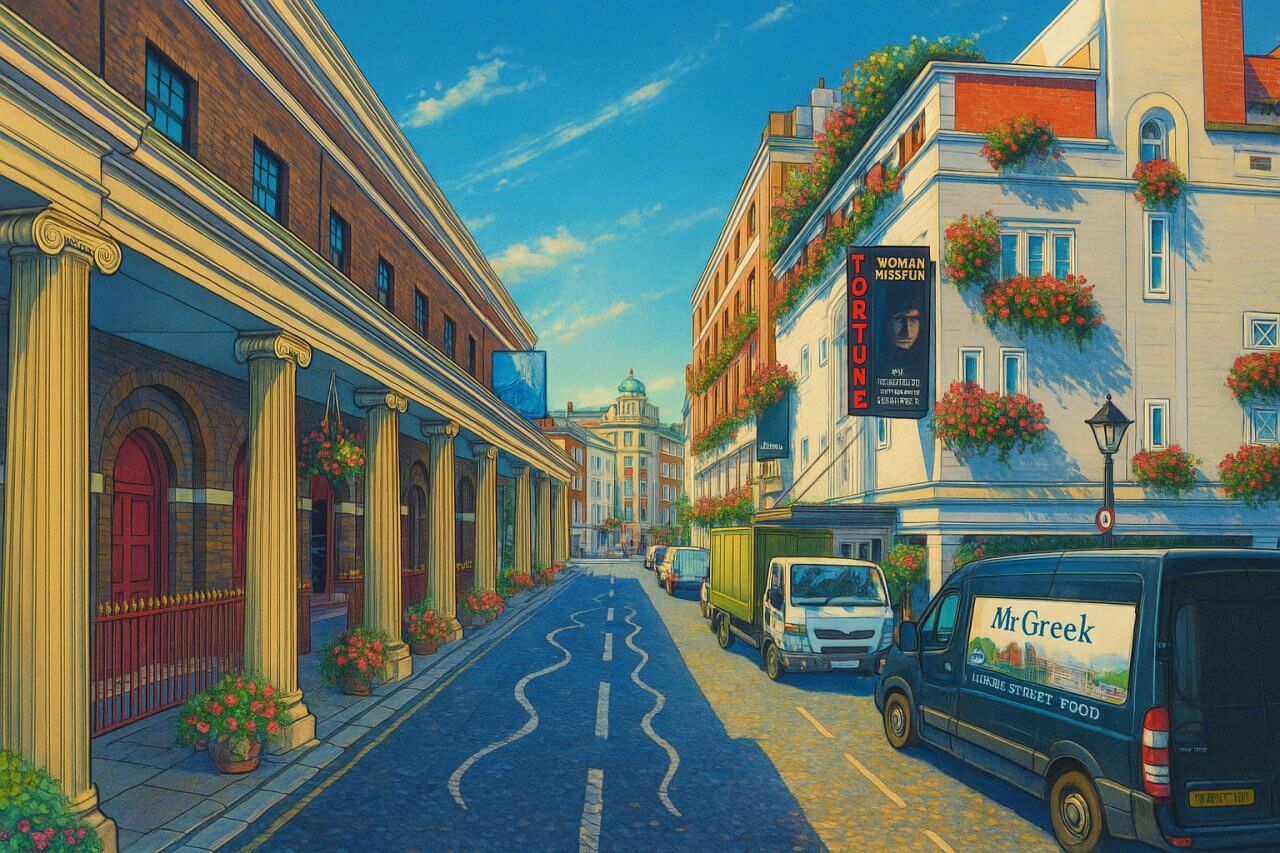
Russell Street, London
Russell Street is a short but historically significant road in the City of Westminster, forming part of the cultural and architectural fabric of London’s West End. The street runs southwest from the junction of Kemble Street and Drury Lane to its picturesque terminus at Covent Garden. Despite its modest length, Russell Street carries immense historical and cultural weight, being in the heart of London’s theatreland and just steps from the iconic Covent Garden piazza.
Overview and Location
Russell Street occupies a central spot in Covent Garden, providing a walking route between the eastern theatre district and the western hub of boutiques, restaurants, and street performances. It lies within a short radius of many key streets, including Bow Street, Catherine Street, and Wellington Street. The street is primarily used by pedestrians, taxis, and local traffic, and its proximity to the Covent Garden piazza ensures a steady flow of footfall, especially during the daytime and early evening hours.
Historical Background
Russell Street dates back to the 17th century and is believed to have been laid out during the expansion of the Covent Garden estate in the 1630s. The name "Russell" likely honours the Russell family, Dukes of Bedford, who were the landlords of the Covent Garden area during that period. The street has long been associated with literary and theatrical figures, with notable 18th and 19th-century writers and actors frequenting the area’s taverns and coffee houses.
Pronunciation: "Russell" is pronounced as RUSS-uhl, represented in the International Phonetic Alphabet (IPA) as /ˈrʌsəl/.
Architectural and Cultural Highlights
Russell Street is rich in historic architecture, including period Georgian and Victorian façades. One of its major landmarks is the Theatre Royal Drury Lane, which, while technically fronting Catherine Street, extends along part of Russell Street and is easily accessed from it. The street is also home to several elegant townhouses now used for retail or hospitality purposes, with charming storefronts and traditional London upper-storey windows.
Nearby Attractions
- Covent Garden Market – a vibrant destination for dining, shopping, and street entertainment.
- The London Transport Museum – just a minute’s walk away, this family-friendly museum explores the city’s transport heritage.
- Jubilee Hall and the Apple Market – offering crafts, antiques, and local goods.
- Multiple theatres including the Lyceum, Duchess, and Novello Theatres.
Transport Connections
Russell Street is well-connected by public transport. The nearest London Underground station is Covent Garden Station, served by the Piccadilly line. Slightly further afield are Temple Station (District and Circle lines) and Embankment Station, which offers access to the Bakerloo, Northern, District, and Circle lines. These options provide convenient connectivity to many other areas of London.
Several Transport for London bus routes serve the area, with nearby stops located on Aldwych, The Strand, and Kingsway. These routes connect Covent Garden to Holborn, Trafalgar Square, and Waterloo.
Real Estate and Living
Due to its prime location and limited availability, real estate on Russell Street commands high prices. As of early 2025, residential properties in and around Russell Street range from compact 1-bedroom flats of about 550 sq ft (51 sq m) to larger apartments measuring up to 1,200 sq ft (111 sq m). Prices typically range between £1.2 million to £2.5 million depending on the property’s size, condition, and view.
Rental rates reflect similar demand, with monthly rents starting around £3,500 for a 1-bedroom flat and rising to over £7,000 for high-end furnished apartments. These figures are consistent with central London averages but on the higher side due to the street’s proximity to Covent Garden and the West End.
Fun Fact
Russell Street once housed the famous "Coffee House" culture of London’s Enlightenment era. The Bedford Coffee House, located here in the 18th century, was a popular meeting spot for actors and writers. It was frequented by Samuel Johnson and David Garrick, and was considered one of the liveliest literary spots in London.
Quick Facts
- Location: Connects Kemble Street and Drury Lane to Covent Garden in the City of Westminster
- Historic Origins: Dates back to the 17th century, linked to the Dukes of Bedford
- Pronunciation: RUSS-uhl (/ˈrʌsəl/)
- Nearby Sights: Covent Garden Market, Theatre Royal Drury Lane, London Transport Museum
- Nearest Underground: Covent Garden (Piccadilly line), Temple and Embankment (multiple lines)
- Bus Stops: Nearby on Aldwych, The Strand, and Kingsway
- Property Prices (2025): £1.2M–£2.5M for sale; £3,500–£7,000/month to rent
- Fun Fact: Once home to the Bedford Coffee House, a meeting point for literary greats
Map of Russell Street, London
 Painting of Russell Street, London
Painting of Russell Street, London